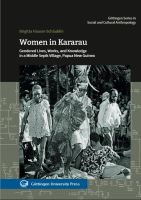Women in Kararau - Gendered Lives, Works, and Knowledge in a Middle Sepik Village, Papua New Guinea
Author(s)
Hauser-Schäublin, Brigitta,
Collection
AG UniversitätsverlageLanguage
EnglishAbstract
The book offers a glimpse back in time to a Middle Sepik society, the Iatmul, first investigated by the anthropologist Gregory Bateson in the late 1920s while the feminist anthropologist Margaret Mead worked on sex roles among the neighbouring Tchambuli (Chambri) people. The author lived in the Iatmul village of Kararau in 1972/3 where she studied women’s lives, works, and knowledge in detail. She revisited the Sepik in 2015 and 2017. The book, the translation of a 1977 publication in German, is complemented by two chapters dealing with the life of the Iatmul in the 2010s. It presents rich quantitative and qualitative data on subsistence economy, marriage, and women’s knowledge concerning myths and rituals. Besides, life histories and in-depth interviews convey deep insights into women’s experiences and feelings, especially regarding their varied relationships with men in the early 1970s. Since then, Iatmul culture has changed in many respects, especially as far as the economy, religion, knowledge, and the relationship between men and women are concerned. In her afterword, the anthropologist Christiane Falck highlights some of the major topics raised in the book from a 2018 perspective, based on her own fieldwork which she commenced in 2012. Thus, the book provides the reader with detailed information about gendered lives in this riverine village of the 1970s and an understanding of the cultural processes and dynamics that have taken place since. The book offers a glimpse back in time to a Middle Sepik society, the Iatmul, first investigated by the anthropologist Gregory Bateson in the late 1920s while the feminist anthropologist Margaret Mead worked on sex roles among the neighbouring Tchambuli (Chambri) people. The author lived in the Iatmul village of Kararau in 1972/3 where she studied women’s lives, works, and knowledge in detail. She revisited the Sepik in 2015 and 2017. The book, the translation of a 1977 publication in German, is complemented by two chapters dealing with the life of the Iatmul in the 2010s. It presents rich quantitative and qualitative data on subsistence economy, marriage, and women’s knowledge concerning myths and rituals. Besides, life histories and in-depth interviews convey deep insights into women’s experiences and feelings, especially regarding their varied relationships with men in the early 1970s. Since then, Iatmul culture has changed in many respects, especially as far as the economy, religion, knowledge, and the relationship between men and women are concerned. In her afterword, the anthropologist Christiane Falck highlights some of the major topics raised in the book from a 2018 perspective, based on her own fieldwork which she commenced in 2012. Thus, the book provides the reader with detailed information about gendered lives in this riverine village of the 1970s and an understanding of the cultural processes and dynamics that have taken place since.
Keywords
Papua New Guinea; women; society; Middle SepikISBN
9783863954222OCN
1135857097Publisher
Universitätsverlag GöttingenPublication date and place
2019Classification
Society and Social Sciences


 Download
Download Web Shop
Web Shop